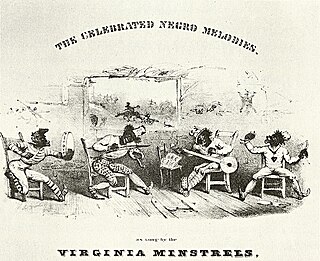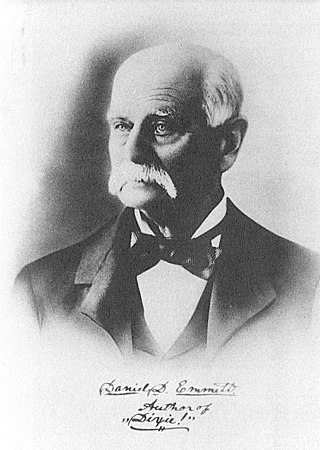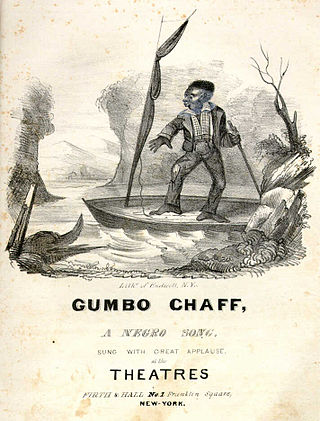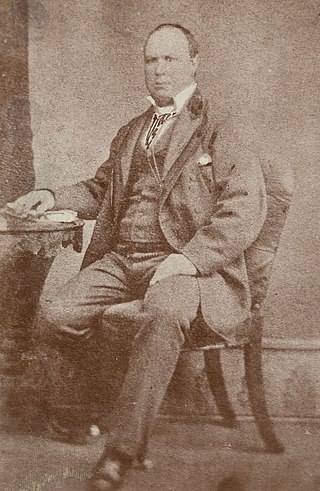Related Research Articles

The minstrel show, also called minstrelsy, was an American form of theater developed in the early 19th century. The shows were performed by mostly white actors wearing blackface makeup for the purpose of comically portraying racial stereotypes of African Americans. There were also some African-American performers and black-only minstrel groups that formed and toured. Minstrel shows stereotyped blacks as dimwitted, lazy, buffoonish, cowardly, superstitious, and happy-go-lucky. Each show consisted of comic skits, variety acts, dancing, and music performances that depicted people specifically of African descent.

The Virginia Minstrels or Virginia Serenaders was a group of 19th-century American entertainers who helped invent the entertainment form known as the minstrel show. Led by Dan Emmett, the original lineup consisted of Emmett, Billy Whitlock, Dick Pelham, and Frank Brower.

Daniel Decatur Emmett was an American composer, entertainer, and founder of the first troupe of the blackface minstrel tradition, the Virginia Minstrels. He is most remembered as the composer of the song "Dixie".

"Dixie", also known as "Dixie's Land", "I Wish I Was in Dixie", and other titles, is a song about the Southern United States first made in 1859. It is one of the most distinctively Southern musical products of the 19th century. It was not a folk song at its creation, but it has since entered the American folk vernacular. The song likely rooted the word "Dixie" in the American vocabulary as a nickname for the Southern U.S.

"Old Dan Tucker," also known as "Ole Dan Tucker," "Dan Tucker," and other variants, is an American popular song. Its origins remain obscure; the tune may have come from oral tradition, and the words may have been written by songwriter and performer Dan Emmett. The blackface troupe the Virginia Minstrels popularized "Old Dan Tucker" in 1843, and it quickly became a minstrel hit, behind only "Miss Lucy Long" and "Mary Blane" in popularity during the antebellum period. "Old Dan Tucker" entered the folk vernacular around the same time. Today it is a bluegrass and country music standard. It is no. 390 in the Roud Folk Song Index.

Joel Walker Sweeney, also known as Joe Sweeney, was an American musician and early blackface minstrel performer. He is known for popularizing the playing of the banjo and has often been credited with advancing the physical development of the modern five-string banjo.
Bryant's Minstrels was a blackface minstrel troupe that performed in the mid-19th century, primarily in New York City. The troupe was led by the O'Neill brothers from upstate New York, who took the stage name Bryant.

"Gumbo Chaff", also spelled "Gombo Chaff", is an American song, first performed in the early 1830s. It was part of the repertoire of early blackface performers, including Thomas D. Rice and George Washington Dixon.

"Sich a Getting Up Stairs" is an American song that dates to the early 1830s. It was in the repertoire of Thomas D. Rice and other early blackface performers.
"Clare de Kitchen" is an American song from the blackface minstrel tradition. It dates to 1832, when blackface performers such as George Nichols, Thomas D. Rice, and George Washington Dixon began to sing it. These performers and American writers such as T. Allston Brown traced the song's origins to black riverboatsmen. "Clare de Kitchen" became very popular, and performers sometimes sang the lyrics of "Blue Tail Fly" to its tune.
"Johnny Roach" is an American song written by blackface minstrel composer Dan Emmett. The song was first published in 1859. The lyrics tell of a slave who has escaped to the Northern United States, who laments his lost plantation house and realizes that he really belongs in the South:
"I Ain't Got Time to Tarry", also known as "The Land of Freedom", is an American song written by blackface minstrel composer Dan Emmett. It premiered in a minstrel show performance by Bryant's Minstrels in late November 1858. The song was published in New York City in 1859.
"I'm Gwine ober de Mountain", also spelled "I'm Going ober de Mountain", is an American song written by the blackface minstrel composer Dan Emmett. The song may be a precursor to "Dixie", as evidenced by its line "Away down south in de Kentuck brake"; in comparison, "Dixie" includes the line, "Away down south in Dixie". The first phrase of "I'm Gwine ober de Mountain" was probably modeled after "The Spinning Wheel", an older English song.

Richard Ward "Dick" Pelham, born Richard Ward Pell, was an American blackface performer. He was born in New York City.

William M. Whitlock was an American blackface performer. He began his career in entertainment doing blackface banjo routines in circuses and dime shows, and by 1843 he was well known in New York City. He is best known for his role in forming the original minstrel show troupe, the Virginia Minstrels.
"Ole Bull and Old Dan Tucker" is a traditional American song. Several different versions are known, the earliest published in 1844 by the Boston-based Charles Keith company. The song's lyrics tell of the rivalry and contest of skill between Ole Bull and Dan Tucker. The song also satirizes the low pay earned by early minstrel performers: "Ole Bull come to town one day [and] got five hundred for to play."
"Miss Lucy Long", also known as "Lucy Long" as well as by other variants, is an American song that was popularized in the blackface minstrel show.

Francis Marion Brower was an American blackface performer active in the mid-19th century. Brower began performing blackface song-and-dance acts in circuses and variety shows when he was 13. He eventually introduced the bones to his act, helping to popularize it as a blackface instrument. Brower teamed with various other performers, forming his longest association with banjoist Dan Emmett beginning in 1841. Brower earned a reputation as a gifted dancer. In 1842, Brower and Emmett moved to New York City. They were out of work by January 1843, when they teamed up with Billy Whitlock and Richard Pelham to form the Virginia Minstrels. The group was the first to perform a full minstrel show as a complete evening's entertainment. Brower pioneered the role of the endman.

John Diamond, aka Jack or Johnny, was an Irish-American dancer and blackface minstrel performer. Diamond entered show business at age 17 and soon came to the attention of circus promoter P. T. Barnum. In less than a year, Diamond and Barnum had a falling-out, and Diamond left to perform with other blackface performers. Diamond's dance style merged elements of English, Irish, and African dance. For the most part, he performed in blackface and sang popular minstrel tunes or accompanied a singer or instrumentalist. Diamond's movements emphasized lower-body movements and rapid footwork with little movement above the waist.
References
- Mahar, William J. (1999). Behind the Burnt Cork Mask: Early Blackface Minstrelsy and Antebellum American Popular Culture. Chicago: University of Illinois Press.
- Nathan, Hans (1962). Dan Emmett and the Rise of Early Negro Minstrelsy. Norman: University of Oklahoma Press.